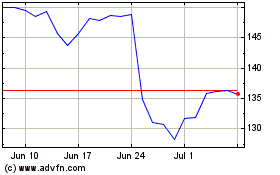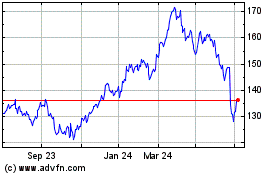As Airbus Turns 50, a Look Back at the Role of the Euro -- Journal Report
January 20 2019 - 9:53AM
Dow Jones News
By Robert Wall
Airbus SE, which turns 50 this year, has its roots in a
consortium formed by the leading plane makers of Germany, France
and Spain. But according to Chief Financial Officer Harald Wilhelm,
it couldn't have become the fully integrated company it is today,
with some EUR66 billion ($75 billion) in market capitalization, had
it not been for the introduction of the euro in 1999.
Mr. Wilhelm, who is set to leave in April after more than 27
years at the company and its predecessor businesses, spoke to The
Wall Street Journal about the challenges of piloting the finances
of an international aeronautics giant, and the crucial role the
euro has played. Edited excerpts follow.
WSJ: What did the euro's birth mean for Airbus?
MR. WILHELM: The introduction of the euro in January 1999 was
followed in 2000 by the creation of the European Aeronautic Defence
& Space Co. and its plane-making unit Airbus through the merger
of DaimlerChrysler Aerospace, Aerospatiale Matra and, later that
same year, Construcciones Aeronáuticas SA.
The objective clearly was to create the one European aviation
champion.
When I joined the company in the summer of 2000, my first task
was to create a consolidated balance sheet for Airbus. I don't want
to think about how hard that would have been using French francs,
deutsche marks and so forth. You could say the euro's creation was
a kind of conditional precedent for the merger to create EADS and
Airbus.
WSJ: What tangible benefits did you see from having one
currency?
MR. WILHELM: The creation of one currency allowed us to do
significant investments in Europe without considering the exchange
risk -- how is the value of the investments influenced by currency
changes tomorrow. That is a massive benefit.
Then, imagine the daily flow of goods, of parts, traveling all
over Europe. If all of that needed to be traded at daily spot rates
[without the euro], that would be a massive impact in terms of
volatility every day.
The euro, as such, is a pillar of the EADS/Airbus success story
in the past 20 years. It has generated that long-term visibility
and stability.
WSJ:What other upside has the euro delivered for Airbus?
MR. WILHELM: The euro debt and bond market established itself as
the second-most-important [debt] market and, given the
interest-rate level in Europe now, we can say that it is very
favorable in terms of funding costs. We have made use of that
multiple times with recurring debt issuances for various programs.
Also, there is a significant cash position we have -- the pension
assets under management. Bear in mind what all of this would have
been like with the former national currencies, fluctuations and
volatility.
WSJ: The euro has seen significant value swings against the
dollar. How has that affected Airbus?
MR. WILHELM: Legacy currency hedging, in place before the euro
started trading, caused quite a problem in terms of the balance
sheet. After the launch, the euro for a while traded at exchange
rates lower than its inaugural rate. Then the euro strengthened,
and we had to launch competitiveness programs due to the weaker
dollar. [The first such program, in 2007, was a restructuring plan
Airbus called Power8, which sought to reduce inefficiencies in its
international manufacturing process that were causing excessive
overhead and delays.]
WSJ: How did those programs affect Airbus?
MR. WILHELM: Power8, Power8+ and all of the improvement programs
thereafter, which we are still doing today, have made Airbus much
more resilient. It has allowed us to invest, it improved our
margins and cash flow significantly. Just imagine how difficult it
would have been without the euro. It would have been incredibly
complex to do an industrial restructuring and improvement across
Europe, as everybody would have considered short-term tactical
aspects when determining where to put investments, where to
restructure.
WSJ: How have you tried to mitigate the exchange-rate
volatility?
MR. WILHELM: Airbus has one of the largest hedge books, as the
vast majority of our revenue -- commercial aircraft sales -- is
dollar-denominated, while significant parts of our costs are more
euro-denominated. If we had needed to hedge with a higher number of
currencies, it would have been much more complex and
cumbersome.
So that's why I say the euro has been a foundation for the
success of Airbus, operationally but also on the financial side.
But we also increased dollar sourcing.
Now about 60% of our dollar sales are covered by purchases made
in dollars, so we have that natural hedging, too.
WSJ: How nervous were you that the euro could falter during the
2008-09 financial crisis?
MR. WILHELM: Like a lot of corporations, you always look at the
what-ifs. But I don't think we ever got to a point of activating
the plan. It was a fallback. There was a very strong willingness at
the European leadership level to make sure the euro didn't break
apart. The euro being the symbol of Europe, if you take the euro
away what is left? That experience made the euro, I think, even
more resilient.
Mr. Wall is a senior reporter in The Wall Street Journal's
London bureau. He can be reached at robert.wall@wsj.com.
(END) Dow Jones Newswires
January 20, 2019 09:38 ET (14:38 GMT)
Copyright (c) 2019 Dow Jones & Company, Inc.
Airbus (EU:AIR)
Historical Stock Chart
From Mar 2024 to Apr 2024

Airbus (EU:AIR)
Historical Stock Chart
From Apr 2023 to Apr 2024
